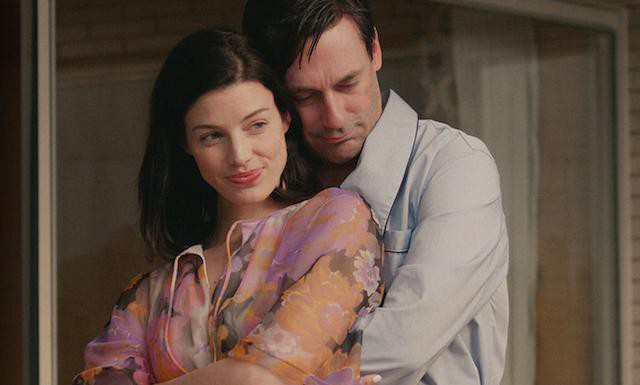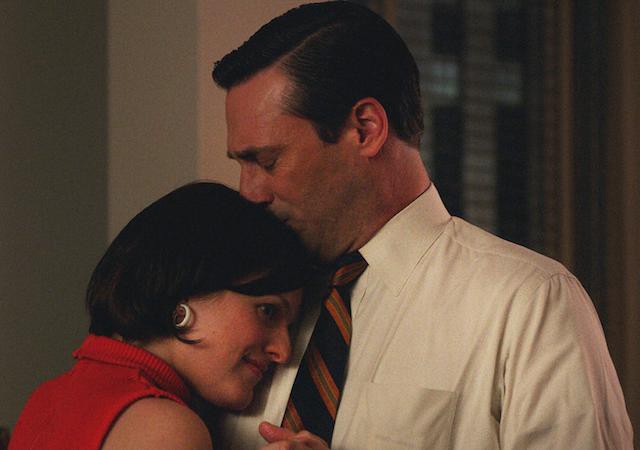Mad Men: “It’s Nice to See Family Happiness Again”
by Jen Doll

You can choose your friends but not your family, wrote Harper Lee in To Kill a Mockingbird; it’s a sentiment that carries through last night’s Mad Men, though it has a twist, because in a time in which the standard definitions of family begin to fluctuate and expand, the boundaries between families and friends and even coworkers blur as well. And, with family, to some extent, you do choose — you can choose your wife or your husband; you can choose to leave (like Roger’s daughter); you can choose to suppress (like Peggy, like Roger) or even recreate (like Don).
Last night’s show, the second to last we’re getting in the first half of the show’s final season, was deceptively simple in an old-fashioned Mad Men-esque way. There were no nipples in boxes, but there was a lot of revelatory emotion, and some movement in terms of what we see of Don’s psyche. Sure, the “family” emphasis in this episode could bring to mind more Helter-Skelter-Manson-Family talk, but I think what we’ll get next week is instead something far less directly historical or violently dramatic and more thematic … though, of course, it all remains to be seen.
“The Strategy,” the title of last night’s show, begins with Peggy interviewing a not particularly enthusiastic mom in a station wagon outside of BurgerChef. What the ad folks find is that BurgerChef is about convenience, and that women are not terribly proud of not making dinner themselves — or, at least, this new role of Mom-who-isn’t-just-a-Mom isn’t fully supported by their husbands. A BurgerChef meal is a cheap solution to a problem of time, and not something to brag about.
Pete and Bonnie are on their way to New York City, arguing about where they plan to stay, and what they’ll do in the city. He’s got to return to his own family, to see Tammy. Even though she’s bought her a Barbie, Bonnie won’t get to meet Tammy — Bonnie’s not part of the family, though she is someone Pete will eagerly agree to join the mile-high club with. (Bonnie asserts her power over Pete through sex; Trudie, interestingly, ends up having a greater power through denying Pete family.)
There’s a quick glimpse of Don cleaning (later we learn it’s because Megan is visiting) and Joan preparing to leave her apartment, where she still lives with her mom and her son. Her mom tells her to eat breakfast — she’s “disappearing” — and Joan retorts with the quintessential daughter comment: “Every time you say something like that I go off my diet.”
Bonnie shows up at the office with Pete, who’s making the rounds; when Stan tells him, “I’m in New York and in love,” he says he is too. Pete’s part of the agency’s L.A. family now, not New York, and what he has with Bonnie isn’t exactly love, but Pete is in New York. Whether it’s because he isn’t fully aware of the anti-Don politics at Sterling Cooper or he’s enacting some sort of latent loyalty to Don, or, maybe, something far more strategic (given the title of the episode), he brings Don in on the BurgerChef meeting. And after Peggy presents the pitch — Moms feel guilty about getting BurgerChef, so they need permission from “Dads” (says Lou) to enjoy it and make it a special family treat — he tells the team that Don should present. Peggy sees this as a demotion, which it is, though it’s one that harks back to what Joan told Peggy a while back: The men at the agency aren’t necessarily being willfully misogynistic. They just aren’t thinking at all, which may make it even worse.
At the end of the call with L.A., upon which Peggy eventually acquiesces to Don presenting (to make matters worse for Peggy, Ted’s on the line, too), Pete crows, “You know she’s every bit as good as any woman in this business!” And the men all agree, and Peggy tries to put on a happy-ish face. When she tells Don he’ll be presenting, which she puts forth as her own idea, he tells her she did a good job (Don as the de facto dad here) but also subtly makes her wonder about the pitch itself. No, we have a strategy, she says, and immediately starts wondering if it’s the right one. Don, given the opportunity to redeem himself, waits until she leaves and then allows himself a moment to be psyched with the enthusiasm of a little boy.

The subtext — maybe not even sub — of the BurgerChef ad is of how families are “supposed” to work. Lou says, when he sees it, “It’s nice to see family happiness again.” But throughout the episode, throughout the show, we see other ways in which “families” work, both good and bad — Peggy and Stan (work family, now estranged), Don and Megan (marriage, heading toward estranged), Pete and Trudie (still married, only in name), and so on. It’s not always happiness, or even close to it. In other families, faux and real: Bob Benson has returned, bringing some GM clients with him (he sets a date with Joan). Megan arrives at Sterling Cooper to see Don. “I didn’t know he was married,” says the receptionist, big oops. There’s a reunion between Stan and Megan (“I miss her,” he says, and Peggy is jealous, though she’s been such a pain in the office this season she hardly has a right to be.)
Later, Bob Benson gets a call in the middle of the night, and has to pick up the GM guy, Bill Hartley, who’s bleeding from the face. “He tried to fellate an undercover officer,” says the cop, and when Hartley tells Bob, “I called you because I knew you could keep this to yourself,” Bob tells him, “I am not of your stripe.” This may be denial, or it may mean that while Bob is gay, he wouldn’t behave the way Hartley does; has too much strategy. In this cab conversation Bob learns that Sterling Cooper is going to lose GM, but Buick is coming to him with a job offer. Back to family: “My wife understands, thank God,” says Hartley, of his sexuality. “How did you live in this city, so much temptation?” “It was hard,” says Bob.
Peggy continues to second-guess herself about the presentation, and later calls Stan about it, though he’s expecting a call from his girlfriend. She then calls Don to yell at him about tainting the initial idea with his opinions. Meanwhile, Pete doesn’t second-guess himself about his visit to Tammy, but she seems to barely remember him, and Trudie isn’t there; instead, there’s a housekeeper named Verna. Everything he remembered about his family is off, and when Trudie’s still not back when he returns with Tammy, he stays in Cos Cob, breaking his date with Bonnie, to wait for her. It’s a counter to Don’s apartment, where Megan is back, setting out breakfast. “Tell me it was all a dream. Tell me you didn’t miss this?” he asks, but she doesn’t. “I missed you,” she says, and later he finds her pulling her things out of the closet to take back to L.A. She may still want to be married to Don, but she doesn’t want his New York life; she has her own in L.A.
When Trudie finally gets home, Pete’s drunk in her kitchen, raging with jealousy. He brings up her father’s heart attack, which she never told him about, and then tries to make her feel like a bad mom. “I don’ t like you carrying on like this, it’s immoral, you have a child,” he says (pots and kettles, etc.). She tells him that they’re getting a divorce, he no longer has a right to say any of this, or even be there: “You’re not part of this family.” Pete puts his beer down in a cake out on the counter, just like a child.
“Uncle Bob” arrives at Joan’s bearing presents for the family. At Don’s apartment, we get a reminder that in the background, in history, Kennedy has been killed by a sniper (breaking a blood family, and also a political one). Don finds Megan at the closet and she suggests they take a trip together next, somewhere not L.A. or New York, without all the stuff of their lives around them.
Back at Pete’s hotel, Bonnie returns, her feet black from wearing L.A. sandals on the streets of New York. She’s been ignored and given the New York Pete treatment, and she doesn’t like it — nor will she let him “fuck his way out of it.” She’s not family, but she has needs, and rights, too, and a bit later, we see her flying back to L.A., a few seats apart from Megan, the curtain closing on the flight and perhaps on their relationships with their men.
At Sterling Cooper, there’s a reunion between Don and Peggy, finally. They work on a revise of the BurgerChef pitch together, and Don admits his flaws of the past: “Whenever I’m really unsure about an idea, first I abuse the people’s help I need, then I take a nap, and then I start at the beginning again,” he tells her.
And Joan and Bob, after their day out, are sitting and talking. Bob has a proposal, a literal one, but Joan is confused. “You shouldn’t be with a woman,” she says, and asks why now. Taking his cue from Hartley, perhaps, Bob thinks it would look better if he had a wife, especially in moving on to Buick. Joan is less concerned about getting married than she is about this bit of information that the agency losing Chevy, and when Bob asks, “Is this what you want, to be nearing 40 in a 2-bedroom apartment with a mother and a little boy?… I’m offering you more than anyone else ever will,” she has the perfect answer. “No you’re not. I want love. I’d rather die hoping that happens than make some arrangement. And you should too.” Hold out for love, Joan. Hold out for the family you choose.
Peggy and Don, together their own weird family, come up with a solution to a problem that wasn’t a problem to anyone but themselves. As they confront what it is about the BurgerChef strategy that’s not working, they realize that it’s outdated. It has to do with a family that doesn’t exist anymore. There are personal confessions between them. Peggy admits she just turned 30 and doesn’t know a thing about being a mom (Don’s the only one who knows she technically is one). Don says he’s afraid he’s never done anything, that he has no one. And Peggy has a brainwave. “What if there was a place, where you could go, where there was no TV, and you could break bread and whoever you were sitting with was family?” Frank Sinatra’s “My Way” plays in the background, and Don holds out his hand, and like a father and daughter, they dance, her head on his shoulder, him kissing the top of her head.
In the office the next day, there are some strategic familial moves: Cutler wants to make Harry Crane partner, and Joan tells Roger about Buick. And Pete and Don and Peggy meet for dinner at BurgerChef, where Peggy tells Pete they’ll shoot the ad there. “It’s not a home,” he argues. “It’s better,” she says, “Every table here is the family table.” They eat, happy families surrounding them, and Don — Dad Don — tells Pete he’s got some ketchup on his face.
Previously: Mad Men: This Comes With All the Strings
Jen Doll is a regular contributor to The Hairpin and author of Save the Date. She’ll be writing about Mad Men all season and invites you to gossip in the comments.